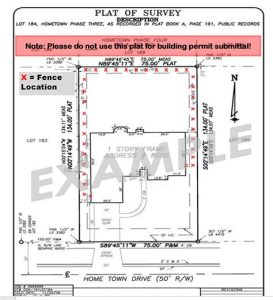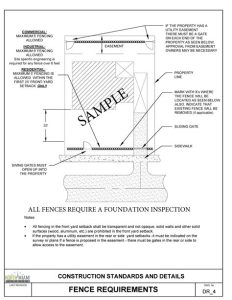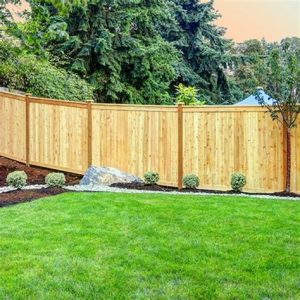Discover fence permit essentials, cost factors, hidden fees, and tips to minimize expenses for your fencing project. Save time and money with our guide!When planning to install a fence, understanding the costs associated with fence permits is crucial for any homeowner. While it may seem like just an extra step in the building process, fence permits play a vital role in ensuring compliance with local regulations and maintaining neighborhood aesthetics. However, the expenses related to obtaining these permits can vary significantly based on several factors, including location, permit types, and specific requirements set forth by municipal authorities. In this blog post, we will delve into the various aspects of fence permits, from understanding their purpose to exploring hidden fees that may arise. We’ll also provide tips on how to minimize these expenses, helping you navigate the permit process with ease and confidence. Let’s dive in and make sure your fencing project starts on the right foot!
Understanding the Purpose of Fence Permits
Fence permits serve as an essential aspect of property development and management. These permits ensure that the installation of a fence complies with local regulations, zoning laws, and safety guidelines. Obtaining a permit can prevent potential disputes with neighbors and contribute to maintaining the aesthetic integrity of a community.
There are several key reasons why fence permits are necessary. First, they help establish clear property boundaries, which can be crucial in avoiding legal conflicts with adjacent property owners. Second, they ensure that the fence meets local safety standards, particularly when it comes to height restrictions and materials used, which can affect visibility and security.
Moreover, acquiring a fence permit can protect property values in a neighborhood by ensuring that all constructions adhere to a consistent standard. This uniformity helps maintain the overall appeal of an area and can boost community pride.
Factors Affecting Fence Permit Costs
When considering a fence permit, understanding the various factors that affect its cost is crucial. Each locality may have different regulations and pricing structures, so knowing what influences these costs can help you budget effectively.
- Location: The area where you live can significantly impact the cost of obtaining a fence permit. Urban areas may have higher fees compared to rural locations due to increased administrative costs.
- Type of Fence: The materials and design of the fence you’re planning can also affect the permit cost. For instance, a simple wooden fence may cost less to permit than an ornate wrought-iron structure.
- Height and Length: Taller and longer fences may come with higher permit fees, as they typically require more detailed inspections.
In addition to the above factors, there may be local regulations that stipulate different approval processes for different fence types. For instance, privacy fences might have varying regulations compared to decorative fences. It’s essential to check your local zoning laws to ensure compliance.
Another aspect that people often overlook is the impact of homeowner associations (HOAs) or neighborhood regulations. These organizations can enforce additional fees or requirements for fence permits, further complicating the cost structure.
Ultimately, being well-informed about these factors will allow you to navigate the fence permit process more efficiently and stay within your budget, avoiding any unexpected surprises.
Comparing Permit Costs in Different Locations
When it comes to securing a fence permit, costs can vary significantly based on your location. Various factors such as local regulations, the size of the project, and even the type of fence you’re planning to install can influence these costs. In this section, we’ll compare permit costs across different regions to give you a clearer picture of what to expect.
In metropolitan areas, for example, the average cost of a fence permit can range from $100 to $300. Cities tend to have stricter regulations and higher administrative costs, which can reflect in the final permit fees. Meanwhile, suburban locations often have lower costs, typically between $50 to $150. However, even within suburbs, the size of the town and its specific zoning requirements can lead to variations.
| Location Type | Average Permit Cost |
|---|---|
| Metropolitan Areas | $100 – $300 |
| Suburban Areas | $50 – $150 |
| Rural Areas | $20 – $100 |
As illustrated in the table above, rural areas often have the lowest permit costs, ranging from $20 to $100. This is primarily due to less stringent regulations and a lower demand for administrative oversight.
Hidden Fees and Additional Costs
When planning to erect a fence, many homeowners focus on the initial costs of materials and labor. However, it’s crucial to consider the hidden fees and additional costs that may arise during the fence permit process. These unexpected expenses can significantly impact your overall budget, leaving you with less funds for other essential home improvements.
One common hidden cost is the inspection fee. Many jurisdictions require a mandatory inspection after the fence is installed to ensure it meets local regulations and safety standards. This fee can vary based on location and type of inspection required, ranging from a nominal amount to several hundred dollars. Additionally, if your fence doesn’t comply with local codes, you may face the cost of removal or modifications, which can further inflate your expenses.
Another cost to consider is the potential need for surveys. If your property lines are ambiguous, you might need to hire a land surveyor to avoid disputes with neighbors. This fee, typically several hundred dollars, ensures that your fence is built within your own property boundaries. Being proactive in understanding these hidden fees and additional costs can help you better prepare for your fencing project.
Tips for Minimizing Fence Permit Expenses
When it comes to installing a fence, one of the overlooked aspects is the cost of obtaining a fence permit. These permits can sometimes add a significant expense to your overall project. Here are some valuable tips for minimizing your fence permit expenses.
First, it’s essential to do your homework before applying for a permit. Research your local regulations and requirements. Some jurisdictions have specific guidelines that could lead to unnecessary fees if overlooked. By being informed, you can align your project with the rules and avoid potential costs.
Secondly, consider applying for the permit during an off-peak season. Many towns are less busy in the winter months, meaning fees might be reduced, or application processing may be quicker. This strategy could save you both time and money.
Lastly, always double-check your application for accuracy. Common mistakes can result in delays and additional charges. A well-prepared application increases your chances of a smooth approval process, ultimately saving you money on potential re-application fees.
Frequently Asked Questions
What is a fence permit?
A fence permit is a legal authorization required by local governments to ensure that fence construction complies with zoning laws and safety regulations.
What are the typical costs associated with obtaining a fence permit?
The costs of a fence permit can vary widely depending on the location, size of the fence, and local regulations, but they generally range from $20 to several hundred dollars.
Are there any penalties for not obtaining a fence permit?
Yes, failing to obtain a fence permit can result in fines, the necessity to dismantle or modify the fence, and potential legal issues with neighbors.
How long does it typically take to get a fence permit?
The time it takes to obtain a fence permit can vary, but it often ranges from a few days to several weeks, depending on the jurisdiction and the complexity of the application.
Can homeowners build a fence without a permit in any circumstances?
In some cases, homeowners may be able to build a fence without a permit if it meets certain height requirements and is within property lines, but this varies by location.
What factors can influence the cost of a fence permit?
Factors that can influence the cost of a fence permit include local government fees, the size and type of the fence, whether the property is in a historic district, and the complexity of the application process.
How can homeowners find out if they need a fence permit?
Homeowners can check with their local zoning office or municipal planning department to find out if a fence permit is required and to obtain detailed guidelines for their area.





